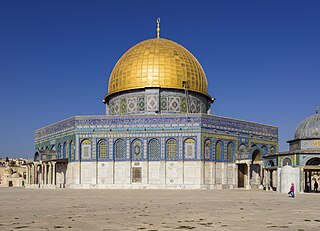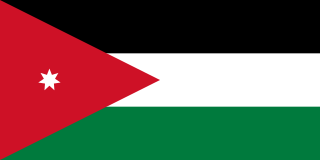Related Research Articles

Palestinians or Palestinian people, also referred to as Palestinian Arabs, are an ethnonational group descending from peoples who have inhabited the region of Palestine over the millennia, and who today are culturally and linguistically Arab.

The Palestine Liberation Organization is a Palestinian nationalist coalition that is internationally recognized as the official representative of the Palestinian people. Founded in 1964, it initially sought to establish an Arab state over the entire territory of the former Mandatory Palestine, advocating the elimination of the State of Israel. However, in 1993, the PLO recognized Israeli sovereignty with the Oslo I Accord, and now only seeks Arab statehood in the Palestinian territories that have been militarily occupied by Israel since the 1967 Arab–Israeli War.

The history of Jordan refers to the history of the Hashemite Kingdom of Jordan and the background period of the Emirate of Transjordan under British protectorate as well as the general history of the region of Transjordan.

The history of the State of Palestine describes the creation and evolution of the State of Palestine in the West Bank and Gaza Strip.
Palestinian refugees are citizens of Mandatory Palestine, and their descendants, who fled or were expelled from their country over the course of the 1947–1949 Palestine war and the Six-Day War. Most Palestinian refugees live in or near 68 Palestinian refugee camps across Jordan, Lebanon, Syria, the West Bank and the Gaza Strip. In 2019 more than 5.6 million Palestinian refugees were registered with the United Nations.

The Palestinian territories are the two regions of the former British Mandate for Palestine that have been occupied by Israel since the Six-Day War of 1967, namely the West Bank and the Gaza Strip. The International Court of Justice (ICJ) has referred to the West Bank, including East Jerusalem, as "the Occupied Palestinian Territory", and this term was used as the legal definition by the ICJ in its advisory opinion of July 2004. The term occupied Palestinian territory was used by the United Nations and other international organizations between October 1999 and December 2012 to refer to areas controlled by the Palestinian National Authority, but from 2012, when Palestine was admitted as one of its non-member observer states, the United Nations started using exclusively the name State of Palestine. The European Union (EU) also uses the term "occupied Palestinian territory". The government of Israel and its supporters use the label "disputed territories" instead.

Palestine, officially the State of Palestine, is a country in the Southern Levant region of West Asia. Founded on 15 November 1988 and officially governed by the Palestine Liberation Organization (PLO), it claims the West Bank and the Gaza Strip as its territory, all of which have been Israeli-occupied territories since the 1967 Six-Day War. The West Bank contains 165 Palestinian enclaves that are under partial Palestinian rule, but the remainder, including 200 Israeli settlements, is under full Israeli control. The Gaza Strip was governed by Egypt but conquered by Israel in 1967. Israel governed the region until it withdrew in 2005. The United Nations, the International Committee of the Red Cross, and various human-rights organizations still consider Gaza to be held under Israeli military occupation, due to what they regard as Israel's effective military control over the territory; Israel disputes this. Hamas seized power after winning the 2006 Palestinian legislative election. This has since been ensued by a blockade of the Gaza Strip by Israel and Egypt.

The Jordanian administration of the West Bank officially began on April 24, 1950, and ended with the decision to sever ties on July 31, 1988. The period started during the 1948 Arab-Israeli War, when Jordan occupied and subsequently annexed the portion of Mandatory Palestine that became known as the West Bank, including East Jerusalem. The territory remained under Jordanian control until it was occupied by Israel during the 1967 Six Day War and eventually Jordan renounced its claim to the territory in 1988.

Since 1948, the term "Palestinian" has mainly been used to refer to the contemporary Palestinian people, defined as equivalent to the region's Arabs before 1948. Before the 1948 Palestine war, "Palestinian" referred to any person who was born in or lived in Palestine, regardless of their ethnic, cultural, linguistic, and religious affiliation. However, since the founding of Israel, the term has shifted to denote as a demonym the direct descendants of what was referred to as the region's Arab populace, having developed a distinctly Arab national identity. In contrast, the non-Arab Palestinian Jews became known as Israeli Jews after 1948, having developed a distinctly Jewish national identity.

Isratin or Isratine, also known as the bi-national state, is a proposed unitary, federal or confederate Israeli-Palestinian state encompassing the present territory of Israel, the West Bank and the Gaza Strip. Depending on various points of view, such a scenario is presented as a desirable one-state solution to resolving the Israeli–Palestinian conflict, or as a calamity in which Israel would ostensibly lose its character as a Jewish state and the Palestinians would fail to achieve their national independence within a two-state solution. Increasingly, Isratin is being discussed not as an intentional political solution – desired or undesired – but as the probable, inevitable outcome of the continuous growth of the Jewish settlements in the West Bank and the seemingly irrevocable entrenchment of the Israeli occupation there since 1967.

Sunni Islam is a major religion in Palestine, being the religion of the majority of the Palestinian population. Muslims comprise 85% of the population of the West Bank, when including Israeli settlers, and 99% of the population of the Gaza Strip. The largest denomination among Palestinian Muslims are Sunnis, comprising 98–99% of the total Muslim population.
Palestinian people have a history that is often linked to the history of the Arab Nation. Upon the advent of Islam, Christianity was the major religion of Byzantine Palestine. Soon after the rise of Islam, Palestine was conquered and brought into the rapidly expanding Islamic empire. The Umayyad empire was the first of three successive dynasties to dominate the Arab-Islamic world and rule Palestine, followed by the Abbasids and the Fatimids. Muslim rule was briefly challenged and interrupted in parts of Palestine during the Crusades, but was restored under the Mamluks.

The following outline is provided as an overview of and topical guide to the State of Palestine:

The Palestinian Authority Passport is a passport/travel document issued since April 1995 by the Palestinian Authority to Palestinian residents of the Palestinian territories for the purpose of international travel.

The Mashriq, also known as the Arab Mashriq, sometimes spelled Mashreq or Mashrek, is a term used by Arabs to refer to the eastern part of the Arab world, located in Western Asia and eastern North Africa. Poetically the "Place of Sunrise", the name is derived from the verb sharaqa, from the sh-r-q root (ش-ر-ق), referring to the east, where the sun rises.

The lives of Palestinian women have transformed throughout many historical changes including Ottoman control, the British Mandate, and Israeli occupation. The founding of the Palestine Liberation Organization in 1964 and the later establishment of the Palestinian Authority in 1994 also played a role in redefining the roles of women in Palestine and across the Palestinian diaspora. Women have been involved in resistance movements in Palestine, Jordan, Syria, and Lebanon throughout the 20th century and into the 21st century.

The Popular Front for the Liberation of Palestine (PFLP) is a secular Palestinian Marxist–Leninist and revolutionary socialist organization founded in 1967 by George Habash. It has consistently been the second-largest of the groups forming the Palestine Liberation Organization, the largest being Fatah.

The two-state solution to the Israeli–Palestinian conflict centres around the establishment of an independent State of Palestine alongside the State of Israel, in the region west of the Jordan River.

Palestinian nationalism is the national movement of the Palestinian people that espouses self-determination and sovereignty over the region of Palestine. Originally formed in the early 20th century in opposition to Zionism, Palestinian nationalism later internationalized and attached itself to other ideologies; it has thus rejected the occupation of the Palestinian territories by the government of Israel since the 1967 Six-Day War. Palestinian nationalists often draw upon broader political traditions in their ideology, examples being Arab socialism and ethnic nationalism in the context of Muslim religious nationalism. Related beliefs have shaped the government of Palestine and continue to do so.

Jordan–Palestine relations are strong, historical, bilateral relations.